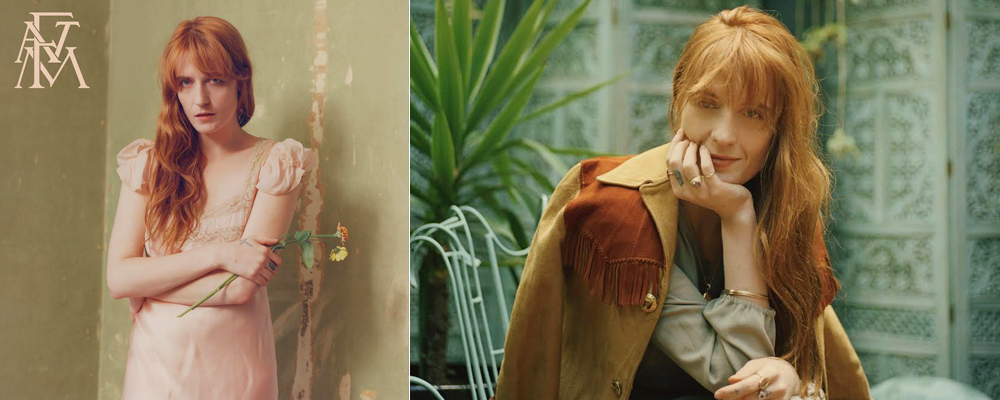Florence and the Machine Are Reflective, Existential and Anthemic on ‘High As Hope’
Adi Mehta
Florence and The Machine is often carelessly labeled with numerous descriptions, such as indie rock, art rock, and baroque pop. The latter might be the most accurate, as the group are characterized by their grand, lush theatricality. Singer Florence Welch is the type of vocalist that seems born to pack arenas, a quality that has brought her well-deserved acclaim and fanfare that has steadily risen since the band’s 2009 debut “Lungs.” Their fourth and latest album, “High As Hope,” is an epic, intimate, and emotional recording showcasing the group at its finest.
Opener “June” begins with Welch over faint piano, singing “The show was ending and I had started to crack / Woke up in Chicago and the sky turned black.” The lone intimacy of these opening moments is apt, as it functions to introduce much of the album’s thematic nature. Backing vocals gently enter the mix, and suddenly an eerily exhilarating siren, of sorts, sounds off, prompting Welch to erupt into her trademark, theatrical, bellowing. After some tempered buildup, choirs, lush orchestration, and crashing drums lift the sound to staggering heights. Lead single “Hunger” picks up on this anthemic quality, seeming as studium-ready as could be. For one, the chorus lyric, “We all have a hunger,” — with its unifying and aspirational yet open-ended sound — seems the perfect type of line to belt out histrionically on grand stages. The ferocity with which Welch exclaims the words “Friday night” later in the chorus is downright thrilling. One comparison that has often been leveled at Welch, somewhat unfoundedly, is to Kate Bush, but there are moments in this song when the two’s inflections are similar. and the whole song is instantly catchy in a bombastic, but authentic way.
“South London Fever”starts with a lighthearted chord rhythm and nostalgically chirpy “Ooh ah ahs” that immediately put it into the category of reflective, reminiscent storytelling. It turns out, however, to be a bittersweet affair. Welch recalls the carefree days of youth, recalling, “I thought it doesn’t get / Better than this,” but she goes on to admit now feeling a looming, general uncertainty. She reasons, “We’re just children wanting children of our own / I wanted space to watch things grow / But did I dream too big? / Do I have to let it go?” It seems to touch upon the understood impermanence of youth, and ambiguity of its nature, and the disconcerting notion of conformity and compromise.
Welch has spoken of how she is not religious, but fascinated by religious iconography. This predilection makes its way into “Big God,” with the lyrics, “You need a big god / Big enough to hold your love… Big enough to fill you up,” essentially some way to fill the void and to channel unrequited affection. The grandeur with which Welch sings the titular phrase gives the song a truly epic sound. There’s a triumphant brass bit at the end that makes for a satisfying climax.
While Welch’s lyrics never exactly descend into ennui per se, the aforementioned unease about “dream(ing) too big” is a recurrent theme. “Sky Full of Song” is a sweeping tearjerker with the lyrics, “Grab me by the ankles, I’ve been flying too long.” “Grace” is a song addressed to Welch’s younger sister. It’s a heartfelt sentiment, and it’s masterfully sung and orchestrated, but the lyrics are so unabashedly personal and simplistically direct that they can make the song a bit hard to take, as if it were meant to be played Disney style at some junior high ceremony. The next song, however, is also a dedication, and a more creatively realized one. “Patricia” is devoted to legendary artist and author Patti Smith, an idol of Welch’s. The song is considerably more upbeat and joyous in tone than anything else on the record, with repeated, soulfully voiced affirmations of “I believe her,” and emphatic interjections that give it an almost motown feel at moments.
“100 Years” begins, like the opener, in quiet reflection, but the previously expressed fear seems to have largely turned into empowerment. The song builds into a festive, percussive stomp, with Welch trying on her most gospel stylings, soaring with evangelical convictions, and singing, “Give me arms to pray with / Instead of ones that hold too tightly.” As peachy as this sounds, however, don’t think that Welch has suddenly seen the light, donned a wide grin, and pranced off toward the horizon. The album has its effervescent moments, but those are merely steps along the way of an emotional journey.
Having spoken in the aforementioned “South London Fever” of how she once thought “it doesn’t get / Better than this,” Welch concludes, in “No Choir,” on a strikingly more solemn note, that, “It’s hard to write about being happy / ‘Cause the older I get / I find that happiness is an extremely uneventful subject.” Still, it would be a gross misinterpretation to consider this a reservation to doom and gloom. After all, it’s a common philosophical position that what we’re really after is not actually happiness per se, but satisfaction — likely the very satisfaction Welch alludes to in her single’s anthemic line, “We all have a hunger.” And for good measure, she adds, in her closing track, “And if tomorrow it’s all over / At least we had it for a moment / Oh, darling, things seem so unstable / But for a moment we were able to be still.” This seems to be not only the conclusion of all Welch’s contemplation, but also an idea embodied by her very music: the joy of reveling in the moment. You can hear it in her booming, confident, passionate voice, and witness it in the sincerity of her dedication to her craft. On the whole, “High As Hope” is both a thoughtful, emotional lyrical body, and a powerful musical achievement.
“High As Hope” is available June 29 on Apple Music.

